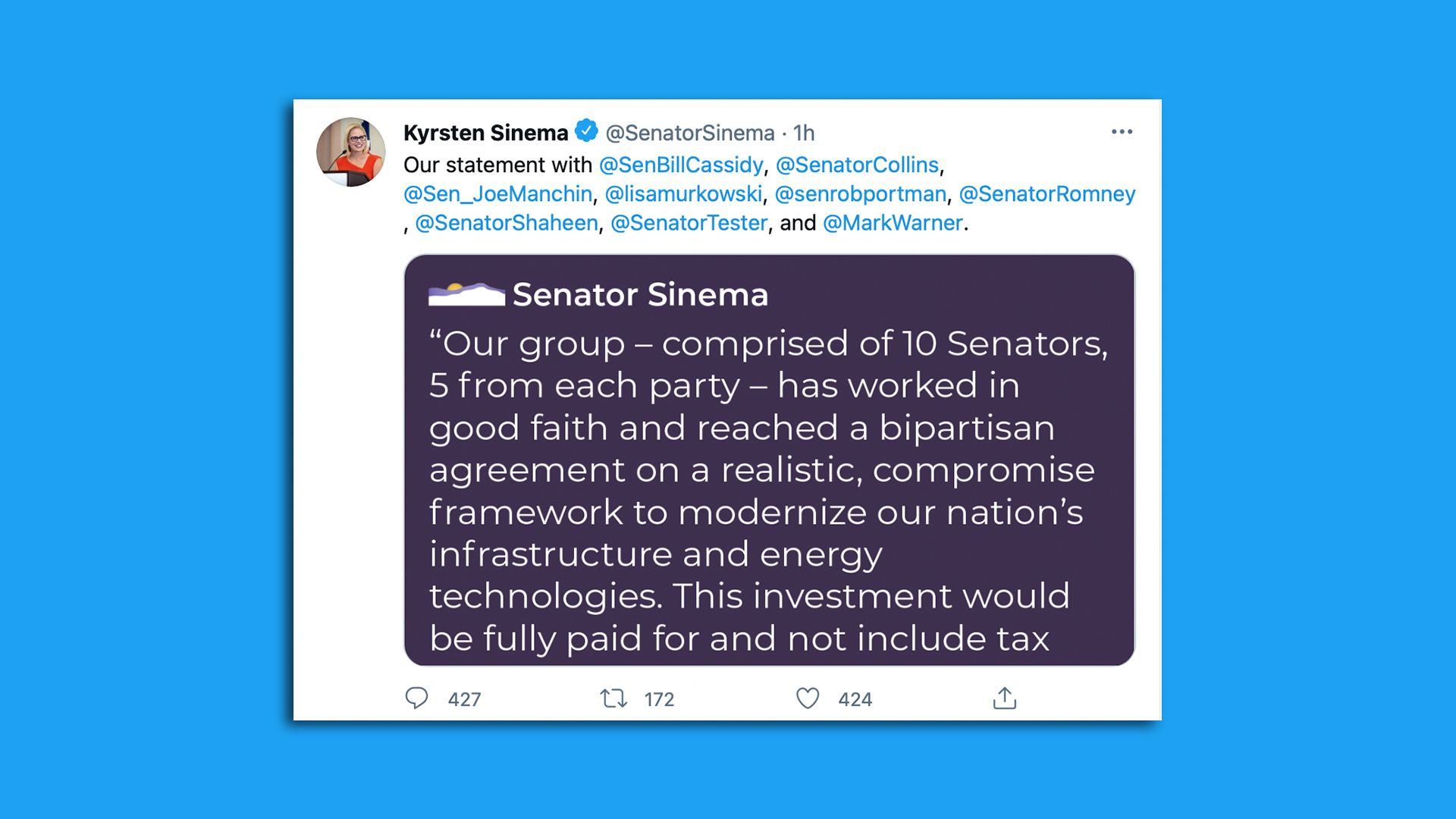The best infrastructure deal Biden's gonna get
Add Axios as your preferred source to
see more of our stories on Google.

Via Twitter
The infrastructure deal announced Thursday night by a group of 10 Democratic and Republican senators is likely the best bipartisan bill President Biden is going to get.
Why it matters: It has the backing of Democrats' most rebellious party members — Sens. Joe Manchin (D-W.Va.) and Kyrsten Sinema (D-Ariz.) — as well as the support of key Republican senators. The question now is whether the group can convince progressives and the broader GOP conference to get on board, too.
Our thought bubble: It's going to be very hard to sell this package to the rest of Congress.
- Even with five Republican senators, it's still not the group of 10 GOP members they need to garner the 60 votes required to pass major legislation.
Driving the news: The proposal from a splinter group of the so-called G20 bloc of bipartisan senators focuses on "hard" infrastructure and doesn't touch on the more ambitious parts of Biden's package — the provisions outlined in the American Families Plan.
- It would cost $974 billion over five years, or $1.2 trillion if extrapolated over eight years. About $579 billion of the total would be new spending.
- The biggest sticking point remains how to pay for it. As of now, the plan would cover the cost of the entire bill without raising taxes.
- The group proposes paying for it through unspent coronavirus relief aid, public-private partnerships, indexing the gas tax to account for inflation and allowing states to borrow necessary money through a revolving loan fund.
- Biden has expressed resistance to several of those ideas, but he's also a former senator who knows how to cut deals.
The remaining challenge:
For Republicans: It's a very open question whether the Republican senators in this group (all considered moderates) represent the rest of their conference.
- Sen. Shelley Moore Capito (R-W.Va.) had the backing of Senate Minority Leader Mitch McConnell (R-Ky.) when trying to negotiate her own agreement with Biden.
- McConnell has yet to say he'll support this new group's efforts. Without his blessing, most Republican senators won't go for it.
But, but, but: Agreeing to the deal would insulate Republicans from criticism they’d surely face if they just blocked such popular legislation.
- That's also a danger for progressives who might want to vote against it because it's not big enough for them or their Democratic constituencies.
For Democrats: Biden promised progressives a big, bold, once-in-a-generation infrastructure package that would bring about transformational change not only for roads, bridges and highways but also climate change, child care and education.
- This package doesn't do that, and the progressive wing of the party is already chafing to go the partisan route and pursue a reconciliation bill that would be far more ambitious.
- Sen. Bernie Sanders (I-Vt.), the chairman of the Senate Budget Committee who has long been ready to stop talking to the GOP and go it alone, said a reconciliation bill would include both Biden’s American Jobs Plan and American Families Plan.
- That would create a combined price tag of nearly $4 trillion — which even more moderate Democrats tell us they would have a hard time backing.
What to watch: Even if this bipartisan group of 10 succeeds in striking a deal on the traditional infrastructure portion (Biden's Jobs Plan), Democrats insist they'll try to pass the rest (the Families Plan) via reconciliation.
- Senate Majority Leader Chuck Schumer (D-N.Y.) said this week that Democrats are working on a reconciliation bill as a backup plan in case the bipartisan negotiations fail.
- He added that he plans to move forward with an infrastructure bill in the Senate in July, whether or not a deal between the two sides is reached.
